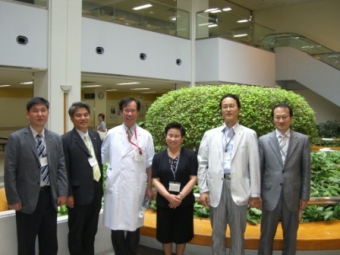Over the Years
Home > Over the Years > Korea: A-bomb Survivors Medical Supports Delegation
Korea: A-bomb Survivors Medical Supports Delegation
Members:
| Leader | Myung-Se Kim | Professor of Radiation Oncology, College of Medicine, Yeungnam University |
| Member | Jin-Kook Kim | Chief Doctor for Nuerology Department Red Cross Hospital in Daegu |
| Member | In-Sung Park | Professor of the Department of Neurosurgery Geongsang National University Hospital |
| Member | Seok-Woo Kang | Chief Doctor of Endocrinology & Metabolism Seoul Red Cross Hospital |
| Member | Jeon-Su Park | Chief Doctor of Department of Family Medicine Busan Medical Center |
Period:
Training Organizations (in order of occurrence):
Hiroshima University Research Institute for Radiation Biology and Medicine
Radiation Effects Research Foundation
Hiroshima Red Cross Hospital and Atomic-bomb Survivors Hospital
Hiroshima A-bomb Casualty Council
Visit Hiroshima Peace Memorial Museum and other A-bomb related sites
Impressions:
Dr. Myung-Se Kim
Professor of Radiation Oncology
College of Medicine, Yeungnam University
I was immensely surprised by all the effort put towards the execution of a successful training program. We are now seriously considering the acceptance of trainees at our own Yong-Nam University Radiation Oncology department.
I am certain that the training I received via the HICARE program will be immensely useful in my continuing work.
Dr. Jin-Kook Kim
Chief Doctor of Neurology Department
Red Cross Hospital in Daegu
Given that the training is not lecture based, it seemed to me that there was not nearly enough opportunity for thorough discussion. There was not nearly enough information given prior to the training program through Korean Red Cross. Because of differences in viewpoint: 1) between different specialties 2) between organizations with which HICARE works, I feel that discussions aimed at a program-wide adjustment / integration are necessary.
Dr. In-Sung Park
Professor of the Department of Neurosurgery
Gyeongsang National University Hospital
I now understand the activities undertaken by HICARE including their international efforts at reducing the suffering of the atomic bomb while spreading word of such devices’ destructive power. I also was able to confirm the many research activities HICARE is undertaking with regards to the effects of radiation.However, although treatment of radiation related disease is important, of further importance is the removal of the root cause.This includes the further strengthening of safety measures at atomic power facilities as well as the implementation of effective countermeasures in the event of an accident. If there is anything I can do regarding HICARE activities in the future, however insignificant, I would be glad to help.Once again I understand the need for continuing efforts to reveal the root causes of accidents and other incidents.
Dr. Seok-Woo Kang
Chief Doctor of Endocrinology & Metabolism
Seoul Red Cross Hospital
Although I had previously heard about the victims of Hiroshima and Nagaski, I had not understood them fully. This training provided me with my first knowledge of HICARE and its activities: HICARE is an organization which endeavors, via governments, medical associations, radiation research associations, etc., in many countries, to pursue the further treatment and management of radiation victims.
I believe that HICARE should continue to invite and train doctors from around the world, sharing their wealth of knowledge and experience. For me personally the training was an opportunity to think not only about patients medical condition, but also to address issues with regards to their environment as well as mental/emotional state. I feel that the training was most useful and would like to express my thanks for being able to participate..
Dr. Jeon-Su Park
Chief Doctor of Department of Family Medicine
Busan Medical Center
To begin, for an individual like me with limited knowledge of radiation as well as the effects of the atomic bomb, it was truly stimulating. Henceforth, via the Internet as well as other research materials, I believe it will draw out a great deal of interest with regards to this sort of clinical research. Furthermore, we as well now have the intention of providing a similar type training. After seeing the types of research which occur both domestically as well as abroad, it is abundantly clear that we in Korea need to be more concerned about this sort of research.
In addition, the training was most useful with regards to learning proper treatment for radiation-related diseases and conditions. The variety of discussions to which I was privileged were most useful, and I am most thankful for the opportunity to have participated.
Once again I realize that to solve the language barrier I must study Japanese. At the next opportunity, with family or friends, I intend to return to Hiroshima.
To all the individuals who aided us during our training program, my many thanks.

【from the left】
・Dr. Seok-Woo Kang
・Prof. In-Sung Park
・Dr. Kenichi Arita, Director, Department of Respiratory Disease, Hiroshima Red Cross Hospital and Atomic-bomb Survivors Hospital
・Prof. Myung-Se Kim
・Dr. Jeon-Su Park
・Dr. Jin-Kook Kim




